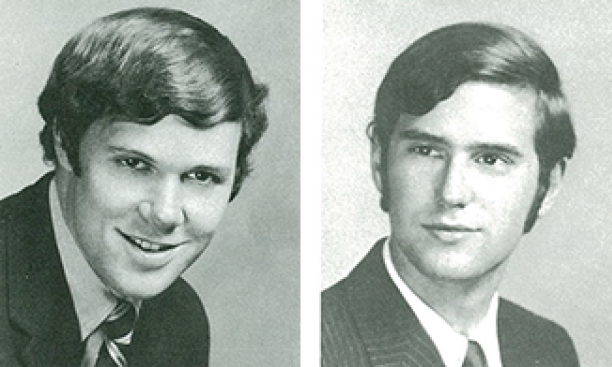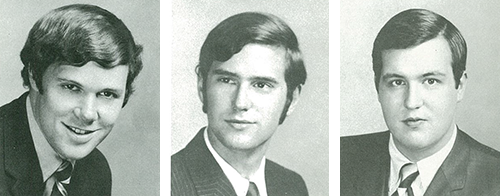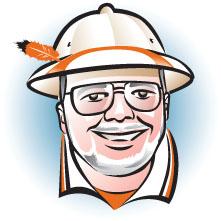
The essence of being human is that one does not seek perfection.
—George Orwell
Periodically I stumble on obvious topics I’ve never addressed in this, Your History Rearview Mirror, and it often amazes me more than you. My recent conscription for a third round as a class officer of the Great Cicadian Class of 1970 causes me to marvel that I’ve never written a column on class officers, critical glue to the alumni experience, without which there’s no Annual Giving, there’s no Reunions, there’s no PAW; there’s not much of anything that Tigers regard as their unique and wildly powerful alumni experience, virtually all of which is built around the class as the engine and the volunteer leadership as its fuel.
Seemingly, it has always been thus. The Class of 1845 elected chairman James E. Montgomery late in its freshman year, Aug. 10, 1842. The 12th issue of the Prince in early 1877 listed the newly anointed senior officers to serve through the year, including president J.F. Williamson 1877 of Ohio and, notably, class historian R.B. Kimball 1877. The historian’s job fell into torpor for many years, but the Princetoniana Committee has been doggedly bringing it back to the fore as current class histories get tougher to keep tabs on, given all the warring websites, subgroup sidetracks, and all-around chaos of the virtual world (in which I giddily complicate things, of course). Most important, many of the younger classes already have had historians before graduation, so they can gather important records in real time, as opposed to trying to figure out what was happening 20 years back. If your class doesn’t have a historian, get one.
But that’s not my job this time around. Having previously frightened classmates and various administrators as reunion chair and then class secretary for five-year terms, this time I got dragooned exalted to the position of class memorialist. This is the dude (six of the current ones are actually dudettes) who, when a classmate dies, marshals the person’s information for the class and PAW and writes the memorial for the end of the magazine. Its simple responsibilities are misleading; in practice, being a memorialist often involves mourning close friends, trying to comfort upset families, or serving as a conduit for the various support resources available (terrible death circumstances frequently bring out the very best in a truly great class). And the obituary limit in the print edition of the PAW is 200 words. Try it sometime; it’s utterly confounding, if not anger-inducing (you’re already more than 300 words into this column!). Not everybody is cut out for this. Even some of the gregarious type-As who thrive as class president get upset and frustrated when a classmate dies on “their watch” — imagine if they also had to stare at the screen and try to summarize someone in 200 words, never mind make sure the family is pleased and friends are updated.
I knew what I was getting into: Twenty years ago I was class secretary when we had no memorialist (many younger classes don’t; only three of the current 27 memorialists are less than 25 years out), and so I wrote the memorials of the relatively few who died over the five years. But, hey, that was eight people, dead essentially before their time (we were in our late 40s), and they included my friend Bill Hendricks ’70, an MD and very fit athlete who dropped dead jogging; Gregg Owens ’70, another MD and pioneer in anti-smoking activism, who was in a coma after a massive stroke for three awful years prior to his death; and my great buddy Jeff Meyers ’70, our station manager at WPRB and air personality extraordinaire, who ended up a legal whiz in Omaha. They all had kids at home. This time around as memorialist I don’t have to do 14 editions of breezy Class Notes annually in addition, but despite being clearly valuable I am not pretending this will be fun. It wasn’t then, it’s not now. But there’s a reason, very important to me, that I actually want to do it, and it goes to heavier issues, even beyond the class.

Suicide on campus is, let’s face it, an evil thing. Anyone capable of dealing with life sufficiently to gain entrance to a place like Princeton would, you’d think, have developed some personal defenses and sense of proportion sufficient to face most of the complexities of college. Regrettably, that’s utter hooey. Former big fish from small ponds become minnows in the ocean and have no defense. The intuitive insight that each of us has into our own weaknesses becomes alarmed fear. Good old-fashioned clinical depression arises for the first time. Disastrous choices seem inevitable, and then …
It’s certainly as bad today as it’s ever been, despite the apparent worldliness of the current matriculants. The college suicide rate has even been inching up recently. Perhaps it’s everybody’s giddy Instagram postings, leaving 90 percent of an insecure online community feeling like they’re in the lowest 10 percent of their peer group. Perhaps it’s the hideous metastasis of helicopter parenting, which not only robs children of their childhood and sandlot pickup games but, more ominously, their defenses against failure and disappointment in college and life. Our generation needs to read such glimpses as those in The New York Times (built around a suicide “cluster” at Penn: six in 13 months), The Huffington Post , The Washington Post, the Prince, or — very tellingly — Tim Ferriss ’00 in The 4-Hour Workweek, and understand how hideously we’ve erred in stifling our children, and how to feel the irrational burdens they feel. I recall reading for the first time about 15 years ago of the wave of self-mutilation in college kids and finding it shocking and impossible to fathom. Princeton has constructed a huge, nationally recognized program of mental-health services that would astonish older alumni; still, Audrey Dantzlerward ’16, a very active junior, committed suicide alone in her dorm room last February. Just this September, the University announced an even higher-profile initiative aimed at all sorts of interpersonal issues; it’s called UMatter. If students truly believed that in the first place, we’d be almost home.
But long before 6 percent admission rates and AP tests, the seeds of depression have been there for disoriented students who feel intolerably pressured to perform, alone against a seemingly hostile world that wishes them gone. The Prince of April 5, 1877 (!) notes theories — from the “evils of competitive examinations” to “hereditary insanity” — about the suicide of a student at Cornell, whose beckoning gorges have made it a grim symbol of student depression over the decades. And that also returns us to my motivation for being an attentive and sympathetic memorialist.
On a non-party weekend in the fall of 1969, my date and I were searching for some friends and wandered by Stevenson Hall to check there. What we found instead was a lone member, my acquaintance Greg McNeil ’70, utterly blitzed (I assumed drunk at the time, but who knows?) and bleeding profusely from both arms. He had put them through leaded-glass windows while in this state; we desperately applied pressure to the wounds and dove for the phone to get the proctors, who seemed to get down to the end of Prospect Avenue in 20 seconds, along with an ambulance. As we watched everyone else rush away, the two of us sat there shaken, almost as much in need of a trusty confidant as Greg had been. At that point, I made my mistake.
Greg was a very quiet, thoughtful, and kind person who was writing a novella for his thesis, a rarity back then. He had many casual friends like me (Stevenson then had every personality type known to man, and nobody was lonely), but few confidants. In retrospect, he seemed to have an inner sadness, and only rarely smiled. I knew him plenty well enough to follow up about his medical repairs, to ask him tactfully how it happened, to see if there was a way I could help, or to find somebody who could. I didn’t. Maybe I was so embarrassed at putting my date through that, or traumatized over wanting to be alone at times myself during the ferment of the ’60s, or afraid of offending him. I just don’t know. I’m sure the good folks at McCosh Infirmary had him in their sights after that night, but as for me, I did nothing. The following March, in his dorm room on a winter night, like Audrey Dantzlerward, he killed himself. I was told his thesis was complete, although it’s not on file in the Archives. He was the only member of our class to die while we were on campus.
When I write a class memorial, I do it on behalf of Greg, who probably would have done it better, but can’t. Am I to blame? Of course not. Are my shortcomings something I need to relearn and overcome, continuously? Most certainly, and he’s my teacher. And I’m sure he wouldn’t mind my using his name to tell you so.
There’s an odd thing about class officers — take a look at your own and you’ll probably see. Many of them tend to be frightfully busy, overstretched, and, on a daily basis, have a dozen more pressing options than herding a thousand cats (Tigers) in a voluntary exercise in group feelgoodism. Why do they bother? I doubt they all have a Greg McNeil in their past. But somewhere they’ve each learned the lesson of taking the trouble to be supportive when it’s silly and superfluous, so you can be sure to be there when it’s critical. Good for them.
Dei sub numine viget.

